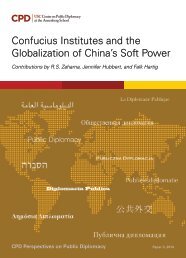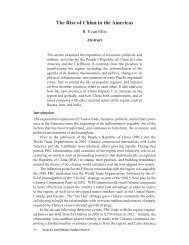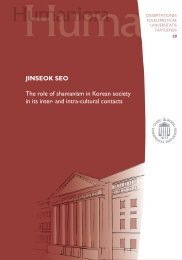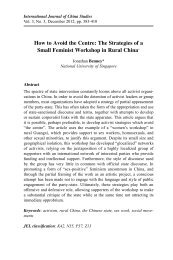- Page 1 and 2: The Labor Politics of Global Produc
- Page 3: Contents Abstract Acknowledgements
- Page 7 and 8: Chapter 1 Introduction To die is th
- Page 9 and 10: and second-class citizens. In their
- Page 11 and 12: Pressed and squeezed so tightly I c
- Page 13 and 14: mobility from within rural and urba
- Page 15 and 16: who were born in the 1960s and who
- Page 17 and 18: Foxconn’s meteoric rise to become
- Page 19 and 20: intervention is political because t
- Page 21 and 22: company leaders have now been made
- Page 23 and 24: My selection of two Foxconn mega fa
- Page 25 and 26: Overview of Chapters This dissertat
- Page 27 and 28: I anticipate that in the long run w
- Page 29 and 30: aspects of the government’s labor
- Page 31 and 32: Nationalist Party brutally suppress
- Page 33 and 34: marked the re-opening of the domest
- Page 35 and 36: Chinese society as in the West, wor
- Page 37 and 38: (1966-1976) and its unprecedented a
- Page 39 and 40: define away labor issues as those o
- Page 41 and 42: survey. In all cases, however, migr
- Page 43 and 44: levels. In fact, from the 1990s, pe
- Page 45 and 46: Capital transforms favoured rural a
- Page 47 and 48: American, European, Japanese, and S
- Page 49 and 50: workers are opening up. As capital
- Page 51 and 52: Chapter 3 China’s Rise and Foxcon
- Page 53 and 54: has been tightly bound with Chengdu
- Page 55 and 56:
enhanced Chinese export competitive
- Page 57 and 58:
Both the Chinese state and workers
- Page 59 and 60:
Soon after the Spring Festival, the
- Page 61 and 62:
Foxconn 60 th in 2011, 43 rd in 201
- Page 63 and 64:
successive revolutions in informati
- Page 65 and 66:
Figure 3.1 Foxconn Employees and Re
- Page 67 and 68:
subsidiaries, was located in Xixian
- Page 69 and 70:
In many provinces, Foxconn runs mul
- Page 71 and 72:
Local governments in Sichuan set up
- Page 73 and 74:
Besides underwriting Foxconn’s hi
- Page 75 and 76:
iPhones and iPads for Apple and ear
- Page 77 and 78:
Chapter 4 The Foxconn-Apple Connect
- Page 79 and 80:
from the fourth floor. 293 Miraculo
- Page 81 and 82:
store outside the United States) at
- Page 83 and 84:
Table 4.2 Apple’s Revenues by Ope
- Page 85 and 86:
global production network. While Ap
- Page 87 and 88:
In this era of the mobile technolog
- Page 89 and 90:
circuit boards, and assembly, to re
- Page 91 and 92:
long-term workers to raise producti
- Page 93 and 94:
Foxconn management, facing stiff pr
- Page 95 and 96:
In a vast construction site of half
- Page 97 and 98:
Apple in the opening line of its Su
- Page 99 and 100:
the Sichuan Provincial Propaganda D
- Page 101 and 102:
information and power asymmetries t
- Page 103 and 104:
sealed tightly in cement burying my
- Page 105 and 106:
20 percent were between 26 and 30.
- Page 107 and 108:
The spatial organization of modern
- Page 109 and 110:
work itself. “We cannot move past
- Page 111 and 112:
At about 8 a.m. on 17 March 2010, Y
- Page 113 and 114:
After the basic wage increase in Ju
- Page 115 and 116:
New workers at Foxconn receive a th
- Page 117 and 118:
adding up to some 800 Yuan.” “I
- Page 119 and 120:
Militaristic Management System Mana
- Page 121 and 122:
often remind assembly-line workers
- Page 123 and 124:
and urge us to speed up.” Line le
- Page 125 and 126:
By December 2009, “unions had bee
- Page 127 and 128:
management. Since learning of this
- Page 129 and 130:
Chapter 6 Students Interns or Worke
- Page 131 and 132:
and school teachers. In this way, F
- Page 133 and 134:
was a young man with whom she did n
- Page 135 and 136:
We’re depressed. We’ve paid for
- Page 137 and 138:
students regardless of field of stu
- Page 139 and 140:
province were made to work at Foxco
- Page 141 and 142:
Table 6.1 Government Recruitment As
- Page 143 and 144:
government support to expand its in
- Page 145 and 146:
4. The Public Security Department c
- Page 147 and 148:
One year later, in October 2013, mo
- Page 149 and 150:
electronics companies 563 ), in the
- Page 151 and 152:
ought up. Yang cultivated a strong,
- Page 153 and 154:
A Foxconn dorm room houses six to 1
- Page 155 and 156:
Yu’s roommates all came from othe
- Page 157 and 158:
Chen Ximei 575 lives in the Foxconn
- Page 159 and 160:
For a two-room unit, the monthly re
- Page 161 and 162:
Street hawkers at the West Gate of
- Page 163 and 164:
percent in 1990 to 30 percent in 20
- Page 165 and 166:
Chapter 8 Legal Activisms: Taking F
- Page 167 and 168:
assignment; otherwise Foxconn shoul
- Page 169 and 170:
observed that labor dispute arbitra
- Page 171 and 172:
especially in cases where outcomes
- Page 173 and 174:
at all levels have directed workers
- Page 175 and 176:
Foxconn abandons its employees, it
- Page 177 and 178:
for specialized diagnosis. He under
- Page 179 and 180:
In an October 2012 company statemen
- Page 181 and 182:
stated a 2008 Foxconn company repor
- Page 183 and 184:
worked at the site for two years, w
- Page 185 and 186:
collective actions in the street, t
- Page 187 and 188:
Justifying the use of paramilitary
- Page 189 and 190:
control and, often, 12-hour shifts
- Page 191 and 192:
Group Fighting and Work Stoppage In
- Page 193 and 194:
competition and will likely cause t
- Page 195 and 196:
finally talked the protesting worke
- Page 197 and 198:
thus far been directed exclusively
- Page 199 and 200:
early 2000s 658 and Walmart retail
- Page 201 and 202:
failed workers time and again. The
- Page 203 and 204:
Chapter 10 Conclusion Few in China
- Page 205 and 206:
development of the western part of
- Page 207 and 208:
workers at Foxconn, not unlike thei
- Page 209 and 210:
Corporate Social Responsibility in
- Page 211 and 212:
to monitor compliance at Foxconn.
- Page 213 and 214:
A number of the most impressive cas
- Page 215 and 216:
market competition and rising costs
- Page 217 and 218:
Appendix 1 Suicides at Foxconn in C
- Page 219 and 220:
4. Cui Hong M, 1987, Hunan 5. Zhang
- Page 221 and 222:
42. Chen Ximei F, 1992, Guizhou 43.
- Page 223 and 224:
29. Liu Shihan F, 1993, Sichuan 30.
- Page 225 and 226:
2. Manager Chen M, 24 3. Manager Zh
- Page 227 and 228:
Appendix 3 Foxconn Locations around
- Page 229 and 230:
Select Bibliography (Books, journal
- Page 231 and 232:
Baldoz, Rick, Charles Koeber and Ph
- Page 233 and 234:
Chan, Anita. 2009. “Challenges an
- Page 235 and 236:
Chan, Ming K. et al., eds. 陳 明
- Page 237 and 238:
Diamant, Neil J., Stanley B. Lubman
- Page 239 and 240:
Gaetano, Arianne M. and Tamara Jack
- Page 241 and 242:
Harvey, David. 2010. The Enigma of
- Page 243 and 244:
Hurst, William. 2004. “Understand
- Page 245 and 246:
Lee, Ching Kwan. 1998. “The Labou
- Page 247 and 248:
Locke, Richard M. 2013. The Promise
- Page 249 and 250:
National Bureau of Statistics of th
- Page 251 and 252:
Pun, Ngai, Chris King-Chi Chan and
- Page 253 and 254:
Seidman, Gay W. 1994. Manufacturing
- Page 255 and 256:
Solinger, Dorothy J. 2009. States
- Page 257 and 258:
Tong, Yanqi and Shaohua Lei. 2014.
- Page 259 and 260:
Wilson, Jeanne L. 1990. “‘The P






